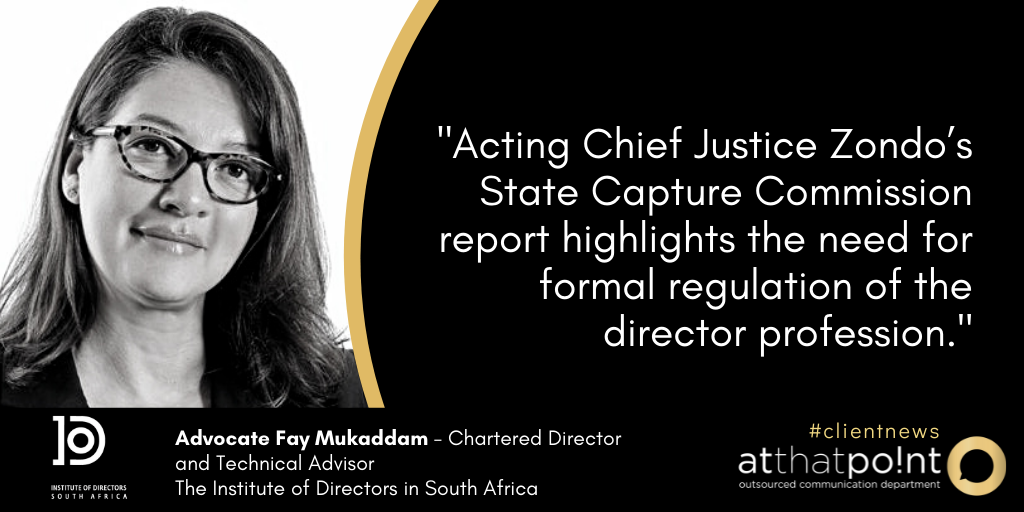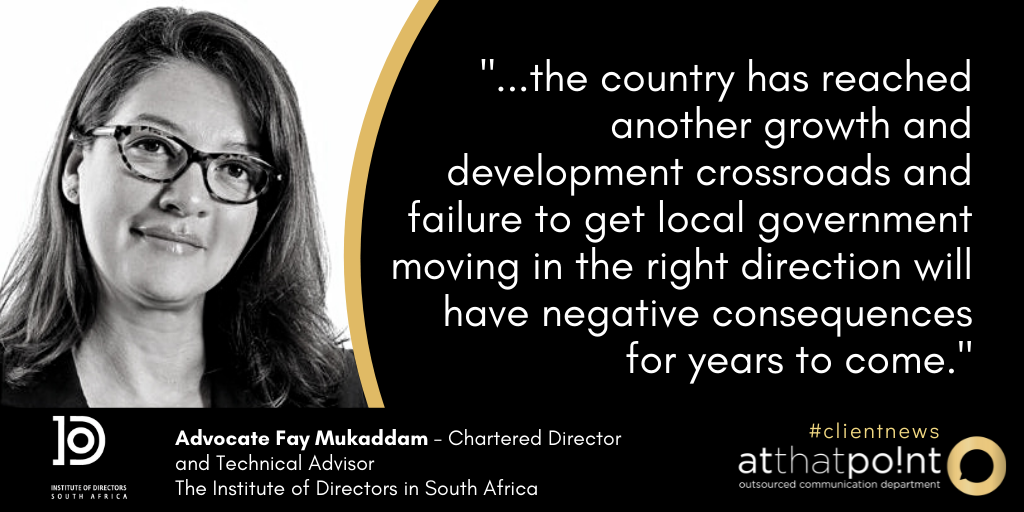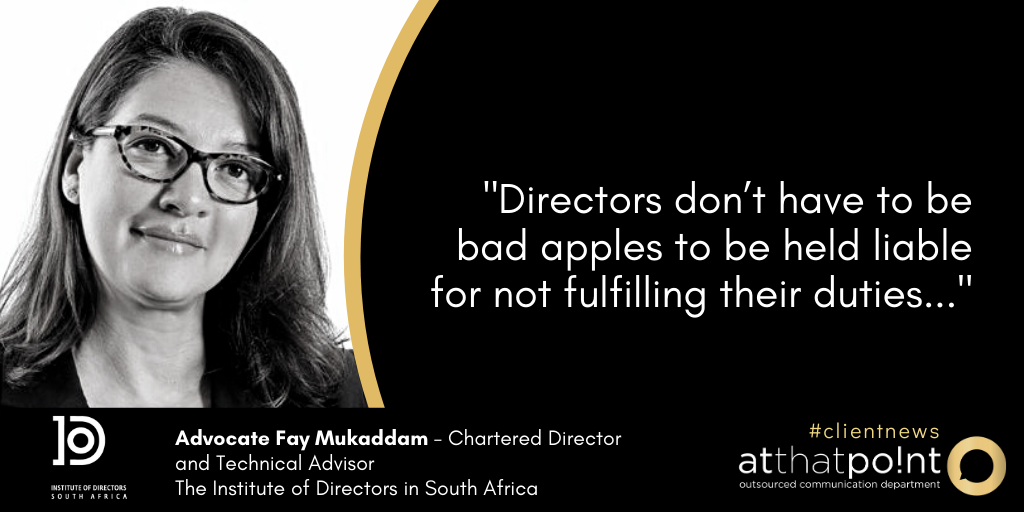 “Acting Chief Justice Zondo’s State Capture Commission report highlights the need for formal regulation of the director profession,” says Advocate Fay Mukaddam, Chartered Director (SA) and Governance Specialist at the Institute of Directors South Africa (IoDSA). As examples, Mukaddam points to the first volume’s allegations of gross mismanagement at SAA and its chairperson at the time eventually being declared a delinquent director by the courts. “While legal action can be taken to prohibit an incompetent or criminal director from serving on any boards in the future, this is effectively closing the stable door after the horse has bolted,” she says, insisting that early prevention is better than eventual punishment. A flawed system What stands out in the report is cadre deployment that saw people appointed to boards in SOEs and public sector entities because of their political connections rather than their fitness as directors. It is evident that they often did not understand or respect their mandate and either neglected or ignored their obligation to the organisation and the law. As a result, they allowed poor performance to infect the corporate culture they were meant to heal and led their organisation to ruin. This signals a flawed recruitment, screening, selection and appointment process and a lack of appreciation for what the roles and responsibilities of a director and board are. "If one doesn't understand what they are elected to do, how can they acquit themselves of their fiduciary duties?" asks Mukaddam. It also appears that, due to their questionable appointment, they were not subjected to the same performance interventions or rehabilitation processes as everyone else. The impact of poor directors SAA is a prime example of what happens when even a few poor directors are appointed to boards. Unfortunately, director acumen and commitment to their duties vary widely across organisations in both the public and private sectors, and low performance can go unnoticed until it is too late. “Professional directors as a collective have a significant impact on the economy, yet almost anyone can become a director without possessing the level of competency essential to their office,” says Mukaddam. The vetting process is largely left to the incumbent board or the vote of the organisation’s shareholders. Mukaddam suggests that this process is unsustainable, especially in developing countries like South Africa where robust policy is critical to economic recovery. A better approach “It is long past due that an independent regulator is empowered to accredit incoming directors against global professional standards, hold them accountable for misconduct, and formalise their continuous professional development on pain of being disqualified,” states Mukaddam. Other significant professionals, like doctors, auditors or attorneys, are required to pass a bar exam or professional evaluation before being allowed to practice. They are also subject to the disciplinary oversight of their professional body and must commit themselves to monitored lifelong learning. Yet none hold more sway over their nation’s prosperity than public and private professional directors. “A regulator, supported by government and the private sector, is far more effective than a long and difficult legal battle for a delinquency judgement after an organisation is already crippled,” says Mukaddam. ENDS MEDIA CONTACT: Idéle Prinsloo, 082 573 9219, [email protected], www.atthatpoint.co.za For more information on the IoDSA please visit: Website: www.iodsa.co.za Twitter: @The_IoDSA LinkedIn: Institute of Directors South Africa Company Page Facebook: Institute of Directors South Africa
0 Comments
 THE upcoming local government elections are unquestionably one of the most important in South Africa’s recent democratic history and the Institute of Directors South Africa (IoDSA) joins a widespread call to urge voters to turn out in their numbers. The Institute’s CEO Parmi Natesan says, “There is sufficient evidence to suggest that many municipalities in South Africa are either failing or close to a state of complete collapse. Poor service delivery has a direct impact on jobs and sustained growth and its only through the ballot box that people can make their dissatisfaction heard and to effect change where necessary.” From a governance perspective, the voters are, after all, key stakeholders in these entities and thus need to hold the leadership to account. According to the office of the Auditor General, less than 40 of the country’s 278 municipalities are said to be on a sound financial footing and should this trendline continue the risk to investment will continue unabated as well as putting increasing strain on the national fiscus as well as South Africa’s sovereign risk. Fay Mukaddam, a governance specialist with the IoDSA notes, “There is no doubt that the country has reached another growth and development crossroads and failure to get local government moving in the right direction will have negative consequences for years to come. And it’s at this level where the crisis is most pronounced. If a municipality is unable to effectively offer the most basic of services, there is an immediate negative sentiment created and this has rapid knock-on effect on the creation of new jobs.” A case in point says the IoDSA was the recent case of dairy company Clover’s decision to relocate its cheese factory from the town of Lichtenburg in the Ditsobotla Municipality due to poor service delivery for number of years. Over 400 – permanent and temporary - jobs were lost which could have been saved had there been more attention focussed on basic issues like garbage disposal and road maintenance. The Institute says for business to remain focussed and competitive; it must have a constant symbiotic and trusting relationship with local government and part of the compact is making sure a sustainable operating environment is delivered all year round. Mukaddam says while the Clover example was a high-profile and well documented issue, there are many other businesses in South Africa that are experiencing similar frustrations and that the November 1 election can be a time for businesses to send a clear and unambiguous message to failing municipalities that they have run out of runway. The IoDSA says it also acknowledges that poor service delivery and inefficient municipalities cannot be an overnight fix and that current problems are in many cases historical. Part of the dilemma according to the Bureau for Economic Research at Stellenbosch University lies with mangers and staff who often lack technical insight; and in the way that tender specifications are drawn up. An additional problem is that many smaller and poorer municipalities do not have a proper tax base. Natesan concludes, “We acknowledge these are deep-rooted problems which result daily in poor management of operational budgets; a failure in many cases to spend capital budgets as well as wasteful and irregular expenditure. And while change might occur at the political level, that doesn’t mean that problems like this will disappear immediately. There is also a vital need for functional and effective change at the governance and administrative level but that the November 1 poll is the starting point.” ENDS MEDIA CONTACT: Idéle Prinsloo, 082 573 9219, [email protected], www.atthatpoint.co.za For more information on the IoDSA please visit: Website: www.iodsa.co.za Twitter: @The_IoDSA LinkedIn: Institute of Directors in South Africa Company Page  News reports indicate that the suspended board of North West Cricket might be facing an application by parent body, Cricket South Africa, to have them declared delinquent directors. While the facts of the matter have yet to be tested in court, being declared delinquent is a serious issue and all directors should take note, says Advocate Fay Mukaddam, Chartered Director and Technical Advisor at the Institute of Directors in South Africa (IoDSA). “On the face of it, this seems to be an issue that does not appear to revolve around looting or corruption such as we see on vivid display at the Zondo Commission. Rather, the issue here seems to be maladministration and the misappropriation of funds,” she explains. “This was only possible if the board failed in its primary responsibility to exercise oversight effectively, and that’s why it and its chairman may potentially be held liable.” The basic facts are that Cricket South Africa made funds available for upgrading a stadium. An investigation by Deloitte showed that R2.2 million of the R10 million received had been used not on the stadium but on operational matters.[1] According to Advocate Mukaddam, this misappropriation of funds should have been picked up by the board in the course of its normal oversight activities. “In other words - and this is a point the IoDSA has always stressed - directors need to have the right skills in order to discharge their fiduciary duties. Being a successful businessperson or professional, or just a good person, is no guarantee you will be a good director,” she says. “Directors bring their existing skills, experience and personal qualities to the table, to be sure, but they also need to learn how to be directors. It’s for that reason that we introduced our Certified Director and Chartered Director designations to provide directors with a way to acquire the necessary directorial skills. “Directors don’t have to be bad apples to be held liable for not fulfilling their duties—if they can’t or don’t do their job, they can also be held liable.” Cricket South Africa placed North West Cricket under administration in 2018 on the basis that its administrative, governance and financial functions were not satisfactory,[2] a lack for which the board is ultimately responsible. If found to be delinquent, directors face the prospect of fines or even jail time and being barred from serving on a governing body for a length of time or forever. [1] Tiisetso Malepa, “North West Cricket board directors could be declared delinquent”, TimesLive (16 March 2021), available at https://www.timeslive.co.za/sport/cricket/2021-03-16-north-west-cricket-board-directors-face-delinquency/. [2] Cricket South Africa press release, “CSA appoints administrator for North West Cricket”(13 December 2018), available at https://cricket.co.za/news/27470/CSA-appoints-administrator-for-North-West-Cricket. |
Archives
July 2024
Categories
All
|

 RSS Feed
RSS Feed